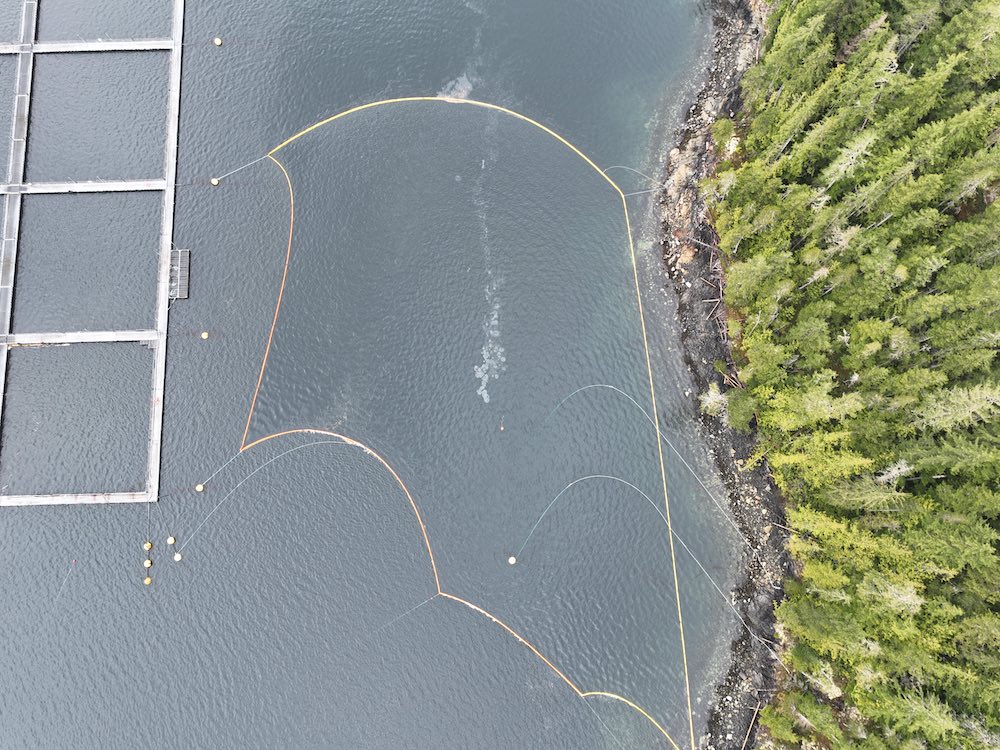A mission is underway to recover a fuel truck holding 17,000 litres of diesel oil that rolled off a barge and sank off Vancouver Island last week.
The Canadian Coast Guard and other responders are trying to raise the truck that sank in the Chancellor Channel about 55 kilometres north of Campbell River.
An internal memo from the Transportation Safety Board confirms the truck carried diesel oil. The federal Department of Fisheries and Oceans confirmed the truck contained five separate tanks, one of which is leaking.
The department says it and First Nations and a marine pollution response company are now trying to extract the truck within the next three days. They believe it is between 27 and 37 metres below the surface.
“The top priority… is the safe retrieval of the tanker within the next 72 hours if possible,” said a DFO statement. “All efforts are focused on achieving that outcome with minimal release of diesel fuel into the marine environment.”
The truck fell off the barge Western Carrier while it was being hauled by the tugboat Risco Warrior to supply fuel to a logging camp on nearby Hardwicke Island.
The government has also contracted the Western Canadian Marine Response Corp., an industry-funded organization with more than 2,300 members, to lay booms in an effort to protect marine life.
The company confirmed to The Tyee it has deployed two boats to the area. Spokesman Michael Lowry said it has deployed booms around the nearby shoreline and the site where the truck sank to mitigate the damage caused by any potential spill. The Coast Guard says more than 1.2 kilometres of protective booms have been deployed.
Both vessels are owned by Marine Link Transportation, whose owner Guy Adams says the incident was immediately reported to the Canadian Coast Guard. Adams said there were three staff aboard the barge at the time.
The day after the Coast Guard and its partners deployed an underwater remotely operated vehicle and observed diesel leaking from one of the tanks.
The Coast Guard said divers had also been dispatched to patch the leaks in the truck, which they described as “intermittent and minimal.”
Adams told The Tyee he is working with the Coast Guard and government officials to recover the truck.
“All the resources that can possibly be brought to bear have been brought to bear,” Adams said.
Mohan Raman of the Transportation Safety Board says the agency believes the truck fell off the board due to inclement weather. Adams says there were “horrific winds” off the coast that day.
Raman, the director of marine operations for the board's Pacific branch, says there will be no further investigation of how the truck fell off the barge.
Adams said three First Nations were also engaged in the response effort. The K'ómoks First Nation, whose territory includes part of the shoreline, declined to comment on the matter.
Adams said Marine Link Transportation works primarily in delivering heavy freight equipment, construction supplies, fuel and other goods to First Nations, construction projects and other clients along remote sites on the B.C. coast.
University of British Columbia professor Juan José Alava said diesel spills are particularly challenging to clean and can be dangerous for marine life.
Compared to other fossil fuels, Alava said, diesel dissipates relatively quickly in water. Once that happens, he said, it can become more difficult to contain and can have dangerous effects on marine life, especially mammals like harbour seals and sea lions.
Alava said this could also affect First Nations who depend on local marine life as a source of food.
He said responders were correct to deploy boons to protect shorelines and contain the spill and suggested they may also pump surface water to remove the diesel if a significant amount is released.
"We might also monitor the species around the spill to see if any animals have been affected or tainted," said Alava, who is part of the university's ocean pollution research group.
Alava said it was fortunate the leaks are minimal so far.
"Seventeen thousand litres is a lot," he said.
Adams said the company and other parties would have more to say on the matter Thursday.
Government responders noted Canada operates on the “polluter pay” principle, meaning companies and individuals responsible for pollution bear the cost of the response. They said they had “full commitment” from Marine Link Transportation. ![]()
Read more: Transportation, Environment
















Tyee Commenting Guidelines
Comments that violate guidelines risk being deleted, and violations may result in a temporary or permanent user ban. Maintain the spirit of good conversation to stay in the discussion and be patient with moderators. Comments are reviewed regularly but not in real time.
Do:
Do not: